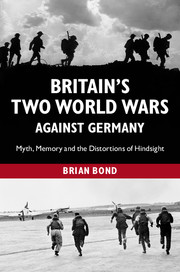Book contents
- Frontmatter
- Contents
- Acknowledgements
- Introduction
- 1 The creation of myths after 1945
- 2 British policy and strategy
- 3 British generalship in the two world wars
- 4 At the sharp end: combat experience in the two world wars
- 5 Attrition in the First World War: the naval blockade
- 6 Attrition in the Second World War: The strategic bombing of Germany
- 7 The transformation of war on the Western Front, 1914–1918
- 8 The British Army’s learning process in the Second World War
- 9 After the wars: Britain’s gains and losses
- Appendix
- Select bibliography
- Index
- References
2 - British policy and strategy
Published online by Cambridge University Press: 05 October 2014
- Frontmatter
- Contents
- Acknowledgements
- Introduction
- 1 The creation of myths after 1945
- 2 British policy and strategy
- 3 British generalship in the two world wars
- 4 At the sharp end: combat experience in the two world wars
- 5 Attrition in the First World War: the naval blockade
- 6 Attrition in the Second World War: The strategic bombing of Germany
- 7 The transformation of war on the Western Front, 1914–1918
- 8 The British Army’s learning process in the Second World War
- 9 After the wars: Britain’s gains and losses
- Appendix
- Select bibliography
- Index
- References
Summary
In 2000 Peter Liddle and his co-editors published a two-volume study entitled The Great World War, 1914–1945, an interpretation which many historians would endorse for viewing the two world wars as a prolonged struggle against Germany’s drive for European hegemony separated by a twenty-year truce. Britain was reluctant to enter either war but fought in both from beginning to end. Her grand strategy was essentially defensive: namely to protect the home islands, her vital sea communications and her empire.
For part of both wars France and Russia (or the Soviet Union) were her co-belligerents against Germany, and in both the USA’s delayed entry was decisive in tipping the balance in Western Europe. In both conflicts Britain’s fundamental assumptions about the likely length and nature of the struggle were soon completely shattered, but with sharply contrasting outcomes. Above all, the most obvious difference cannot be over-stressed. In 1914 Britain had enjoyed one hundred years of freedom from involvement in a major European war during which her industry, finance and commercial links with a worldwide empire, protected by a dominant navy, had together made her the Super Power of the era. Moreover, despite the frequent international crises of the pre-1914 decade, Europe appeared to be enjoying a period of closer communications and growing prosperity in which large-scale wars were widely viewed as unnecessary and counter-productive – indeed almost impossible to wage for more than a few months for economic and financial reasons. True, the Anglo-German naval race and invasion scares, dramatised by the press and fiction writers, had stirred up anti-German feeling (which was fully reciprocated), but in 1913–1914 there seemed little likelihood of a general European war. Where British involvement in a terrible civil war seemed a real possibility was in Ireland as the Home Rule issue, and preparations for armed resistance in Ulster, reached a crisis.
- Type
- Chapter
- Information
- Britain's Two World Wars against GermanyMyth, Memory and the Distortions of Hindsight, pp. 25 - 41Publisher: Cambridge University PressPrint publication year: 2014



